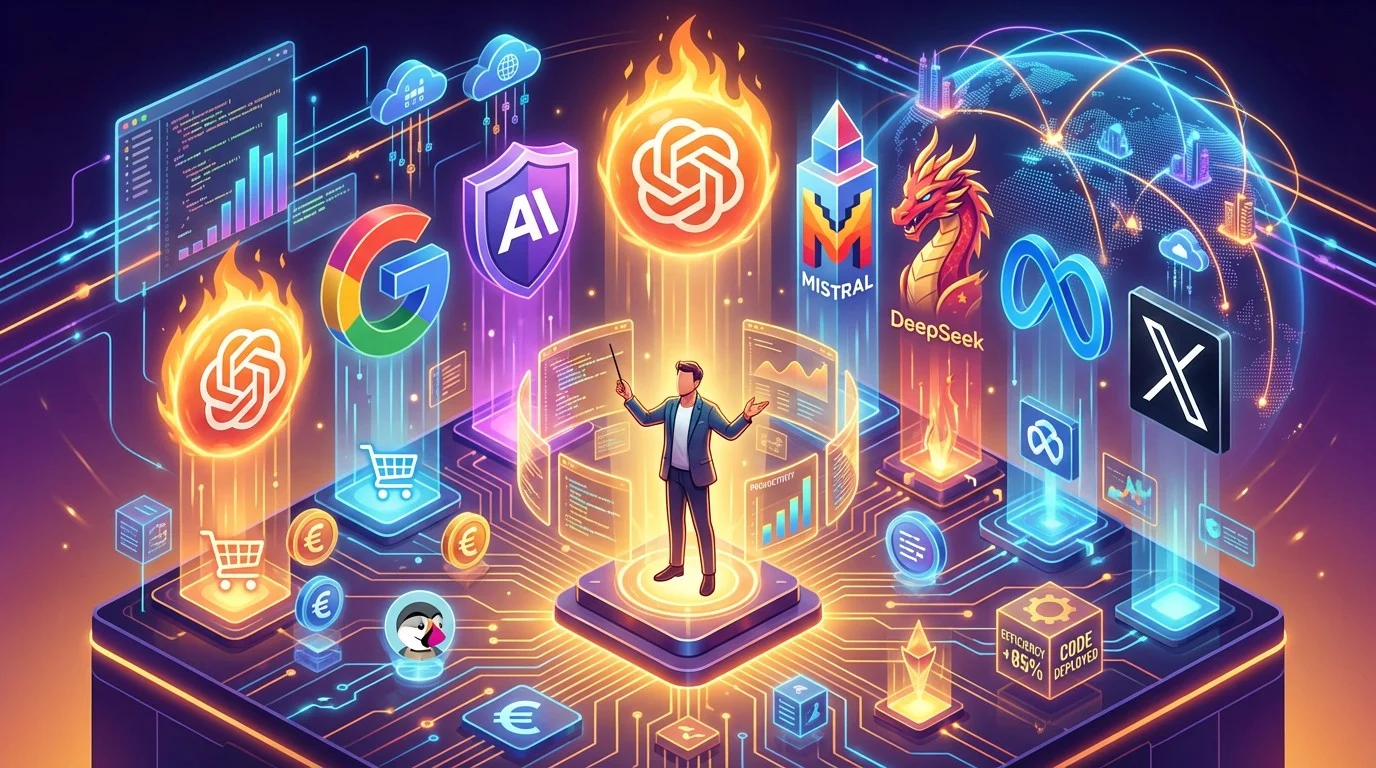🎁 Perplexity PRO offert
Gemini 2.5 Flash Image: Google’s Visual Revolution Finally Arrives
Imagine this scene: you’re working on a marketing campaign for an e-commerce client. You need to quickly transform a basic product photo into professional visual with coherent background, adjust colors according to brand guidelines, and create three variants for different media. Traditionally, this would take you hours in Photoshop. With Gemini 2.5 Flash Image, a natural conversation suffices: “Replace the background with a modern environment, apply a corporate blue tint and create three formats: square Instagram, web banner and vertical story.”
This transformation that was still a dream a few months ago is becoming reality today. Google has just crossed a decisive milestone in visual artificial intelligence, offering creators and developers tools of unmatched precision and fluidity.
The Expected Evolution: When Google Reinvents Visual Creation
Gemini 2.5 Flash Image represents much more than a simple update. It’s the culmination of several years of research at Google DeepMind, designed to address creators’ legitimate frustrations with current AI tools: lack of precision, unpredictable results, complex workflows.
Google’s ambition is clear: democratize professional visual creation by removing technical barriers. No more cryptic prompts and approximate results. The objective is to allow anyone - developer, designer, marketer or entrepreneur - to materialize their visual ideas with the same ease as a conversation.
This conversational approach fundamentally changes the game. Where other solutions require learning a specific “prompt language”, Gemini 2.5 Flash Image understands natural language, contextual nuances and even cultural references. It’s this contextual intelligence that makes all the difference.
The Innovations That Really Change the Game
Generation and Real-Time Editing by Natural Language
The first revolution lies in conversational fluidity. No need to master complex syntaxes or technical parameters. You dialogue with the AI like with an experienced graphic designer:
"Take this product photo and create a premium atmosphere.
Lighting should be soft, background neutral but elegant.
Add a subtle drop shadow to give depth."
The AI understands not only technical instructions, but also aesthetic intentions. It knows that a “premium atmosphere” implies certain visual codes, that “soft” lighting requires graduated shadows, that an “elegant” background avoids garish colors.
Intelligent Image Fusion: The Art of Automated Composition
Intelligent image fusion probably constitutes the most impressive innovation. Gemini 2.5 Flash Image can combine multiple visuals while respecting:
- Light coherence: automatic lighting harmonization
- Geometric perspective: angle and proportion adaptation
- Stylistic integration: render and texture uniformity
Concretely, you can merge a product photo, an atmosphere background and graphic elements into a coherent composition, without any manual retouching.
Visual Consistency: The Holy Grail of Creative AI
A major challenge of current AI tools: maintaining consistency of a character, product or style across different generations. Gemini 2.5 Flash Image solves this problem thanks to its “visual memory”.
You can thus create a series of marketing visuals featuring the same character in different contexts, or decline a product on multiple media while perfectly preserving its visual identity.
Conversational Editing: Retouching by Simple Dialogue
The feature that most impresses beta-testers remains conversational editing. Instead of navigating complex menus, you express your modifications in English:
"The background is too busy, can you blur it more?"
"The logo's red color leans too much toward orange, correct toward a deeper red."
"Delete the object on the right and extend the decor to fill the space."
Each request is understood and applied in seconds, allowing a natural iterative workflow.
How to Exploit Gemini 2.5 Flash Image Now
Developer Access: API and Cloud Platforms
For developers, integration is done via several channels:
Gemini API: Direct integration in your applications
// Example API call (simplified structure)
const result = await gemini.generateImage({
prompt: "Create an e-commerce visual for this product",
baseImage: productPhoto,
style: "modern professional",
format: "1200x800"
});
Google AI Studio: Graphical interface for rapid prototyping and tests Vertex AI: Enterprise deployment with advanced controls
Creative Integrations: Adobe and Partners
The most spectacular integration concerns Adobe Firefly and Express. Available now in certain regions, this collaboration allows Adobe users to access Gemini’s power directly in their usual workflows.
Creators can thus:
- Generate assets directly in Illustrator or Photoshop
- Create content variations for social networks
- Automate marketing visual production
Public Application: Gemini Mobile and Web
The Gemini app progressively integrates these features for the general public. Google’s mobile-first approach allows intuitive use, ideal for content creators and entrepreneurs.
Testimonials and Concrete Use Cases
Adobe: Productivity Multiplied
Adobe teams report spectacular time savings: “What took us a day of creative work can now be done in a few hours, with often superior quality thanks to Gemini’s contextual intelligence.”
WPP: Advertising Campaign Revolution
Communication giant WPP uses Gemini 2.5 Flash Image to create localized variations of international campaigns. “We can visually adapt a campaign to 20 different markets while preserving brand identity, respecting local cultural codes.”
Leonardo.ai and Freepik: Creative Democratization
These creative platforms integrate Gemini to offer their users advanced editing capabilities. “Creators can now achieve professional-level visuals without prior technical training.”
Figma: Intelligent Design System
Integration in Figma allows automatically generating UI component variations while respecting existing design systems, revolutionizing product design workflows.
Why This Revolution Was Necessary
Response to Current Limitations
Existing visual AI tools suffered from several critical flaws:
- Complex prompts requiring technical learning
- Unpredictable results difficult to reproduce
- Limited editing forcing generation restarts
- Uneven quality depending on use cases
Gemini 2.5 Flash Image addresses each of these points with a radically different approach, favoring contextual intelligence over technical parameterization.
Speed and Fluidity: The Competitive Advantage
Low latency constitutes a decisive advantage. Where other solutions require several minutes per generation, Gemini 2.5 Flash Image produces results in seconds. This speed transforms usage: from one-off generation, we move to continuous creative iteration.
Transparency and Ethics: SynthID and Invisible Watermarking
Google natively integrates its SynthID system which adds an invisible but detectable watermark to generated images. This approach responds to legitimate concerns about AI content traceability, particularly crucial for commercial and journalistic uses.
Technical Analysis: Innovations Under the Hood
Advanced Conversational Architecture
Unlike traditional models that separate textual understanding and visual generation, Gemini 2.5 Flash Image uses a unified architecture. The model “thinks” simultaneously in text and images, allowing deeper contextual understanding.
Quality and Professionalism of Renders
First tests reveal a clear qualitative improvement:
- High native resolution without post-processing
- Stylistic consistency maintained across image series
- Fine details preserved even on secondary elements
- Advanced lighting management and materials
Ecosystem Integration: The Network Effect
Integration in the Google ecosystem (Workspace, Cloud, Android) creates a powerful network effect. Companies can integrate visual generation into their existing workflows without technical friction.
Future Perspectives: Toward Augmented Creativity
Agile Marketing and Mass Personalization
Gemini 2.5 Flash Image opens the way to hyper-personalized marketing. Companies can generate thousands of visual variations adapted to each customer segment, each distribution channel, each time of day.
Imagine e-commerce campaigns that automatically adapt:
- To each visitor’s aesthetic preferences
- To visual trends of the moment
- To geographic cultural specificities
- To real-time performance
Productive Design and Collaborative Creation
Creative teams will be able to focus on strategy and innovation rather than technical execution. “Design thinking” will be amplified by tools allowing instant concept materialization.
Democratized Visual Storytelling
Entrepreneurs and SMEs will access creative capabilities previously reserved for large agencies. This democratization could transform the creative ecosystem, favoring the emergence of new talents and business models.
Challenges to Address
Despite these innovations, questions remain:
- Intellectual property: who owns the rights to AI creations?
- Impact on creative employment: how will professions evolve?
- Aesthetic standardization: risk of creation uniformization?
Google will have to navigate these issues while continuing technical innovation.
Conclusion: The Era of Conversational Creativity
Gemini 2.5 Flash Image represents not just a technological improvement, but a paradigmatic shift in our relationship to visual creation. By making image generation as natural as a conversation, Google removes the last barrier between idea and its materialization.
For developers, it’s the opportunity to integrate advanced creative capabilities without graphic expertise. For creators, it’s liberation from technical constraints in favor of conceptual innovation. For entrepreneurs, it’s access to professional visual communication without traditional costs.
This revolution is part of a broader trend: conversational AI that transforms every profession. After code, text and data analysis, it’s visual creation’s turn to become accessible by simple dialogue.
The future belongs to those who will know how to combine human creativity and artificial intelligence. Gemini 2.5 Flash Image gives us the tools to write this future, one image at a time.
Article published on August 27, 2025 by Nicolas Dabène - AI & Innovation expert with 15+ years of experience in integrating emerging technologies
Questions Fréquentes
What is Gemini 2.5 Flash Image?
Gemini 2.5 Flash Image is Google’s image generation and editing solution that allows creating and modifying professional visuals by simple natural conversation. It integrates intelligent image fusion, visual consistency across generations and conversational editing, revolutionizing visual creation by removing technical barriers.
How to access Gemini 2.5 Flash Image?
Gemini 2.5 Flash Image is accessible via several channels: the Gemini API for developer integration in your applications, Google AI Studio for rapid prototyping, Vertex AI for enterprise deployment, and creative integrations in Adobe Firefly and Express. The Gemini mobile app progressively integrates these features for the general public.
What's the difference with other visual AI tools?
Unlike tools requiring complex technical prompts with unpredictable results, Gemini 2.5 Flash Image understands natural language and aesthetic intentions, offers low latency (seconds vs several minutes), maintains visual consistency across generations and natively integrates SynthID for ethical content traceability.
What is intelligent image fusion?
Intelligent fusion allows combining multiple visuals while automatically respecting light coherence (lighting harmonization), geometric perspective (angle and proportion adaptation) and stylistic integration (render and texture uniformity), creating coherent compositions without manual retouching.
Can Gemini 2.5 Flash Image be used professionally?
Yes, Gemini 2.5 Flash Image is designed for professional use with high native resolution, professional render quality, integration in existing workflows (Adobe, Figma), invisible SynthID watermarking for traceability and API allowing automation and mass customization for marketing, product design and commercial content creation.
Is this suitable for beginners?
Yes, this guide is designed to be accessible with step-by-step explanations.
Articles Liés
Fini le Codeur Solitaire : Pourquoi les Développeurs du Futur seront des Orchestrateurs d'IA (et comment s'y mettre sur PrestaShop)
L'ère du "Léviathan" (une seule IA géante qui fait tout) est une illusion. L'avenir du e-commerce et du développement...
PrestaShop vs Sylius : du module au produit, et si le futur était hybride ?
Un simple module PrestaShop peut révéler deux visions du e‑commerce moderne. En comparant l'approche PrestaShop et Sy...
Fini le café devant Excel : Votre "Daily Merchant Morning" 100% automatisé avec PrestaShop et l'IA 🚀
Découvrez comment transformer votre routine matinale e-commerce en recevant chaque matin un briefing stratégique comp...
La Grande Guerre des IA de 2025 : Chronique d'une Révolution qui Redéfinit le E-commerce et le Travail
L'année 2025 restera dans l'histoire comme le tournant décisif de l'intelligence artificielle générative. GPT-5, Gemi...
Comment connecter un serveur MCP à Claude?
Le moment tant attendu : connectons votre serveur MCP sécurisé à Claude Desktop et voyons la magie opérer en conditio...
Comment sécuriser un serveur MCP?
Votre serveur MCP fonctionne ? Parfait. Maintenant, sécurisons-le pour qu'il soit production-ready avec validation, p...
Découvrez mes autres articles
Guides e-commerce, tutoriels PrestaShop et bonnes pratiques pour développeurs
Voir tous les articles






